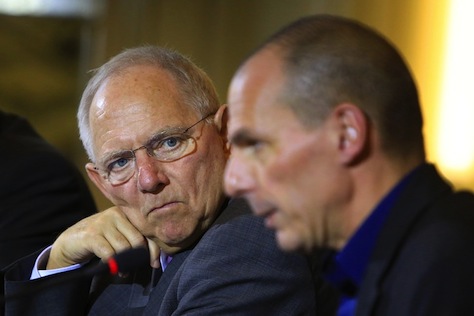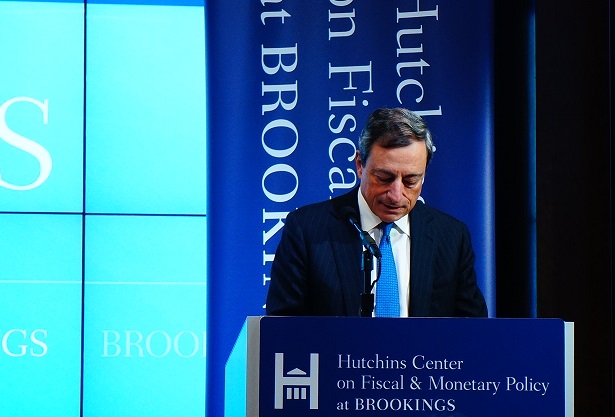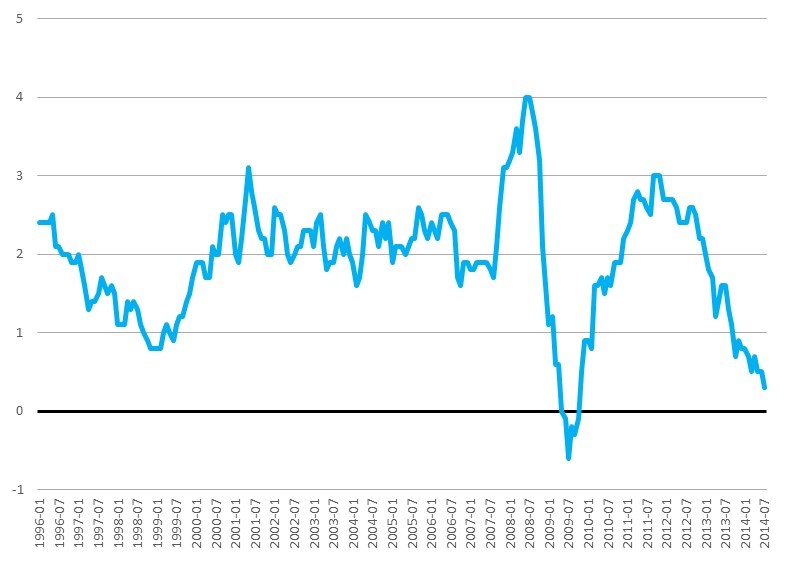 Photo credit to Bloomberg News.
Photo credit to Bloomberg News.
If you want to know which side ‘thinks it won’ in today’s temporary deal between Greece and the Eurogroup, you need look no further than the extraordinary statement from German finance minister Wolfgang Schäuble, who essentially spiked the ball in Greece’s face after winning a key concession from its new anti-austerity government that it would honor existing Greek commitments to its creditors in exchange for a four-month extension of its bailout program:![]()
“Being in government is a date with reality, and reality is often not as nice as a dream,” the conservative veteran said, stressing Athens would get no aid payments until its bailout program was properly completed. “The Greeks certainly will have a difficult time to explain the deal to their voters.”
Even if you think the Greek government had little leverage to force the Eurogroup to accept its demands and even if you think today’s temporary deal is at least a step on the path to a stronger Greece within the eurozone, I can’t think of a statement from any European leader more at odds with reality and basic political acumen since the out-of-touch musings of former French president Valéry Giscard d’Estaing in 2004 and 2005, when he was in charge of the process to enact a constitution for the European Union, a process that died when France itself rejected the constitution in a referendum.
It’s as if Schäuble (pictured above with Greek finance minister Yanis Varoufakis) actively wants to feed the notion that Germany dominates European policymaking. His comments might play well in Munich or Stuttgart, but they’ll be poisonous in Madrid and Athens, and cause some amount of indignation in capitals like Paris and Dublin.
Imagine a different response, whereby German chancellor Angela Merkel delivered a statement that, even while holding steady against concessions to the Greek government, acknowledged Greece’s economic suffering and acknowledged that the Berlin-led bailouts have caused more harm than anticipated — an admission, by the way, that the International Monetary Fund was already making years ago.
A German Europe, and a divided Europe
Greece is in a depression that’s now lasted six years and runs deeper than the Great Depression of the 1930s in either Europe or the United States. Unemployment is rife in Spain, so much so that an untested anti-austerity group, Podemos, now leads polls for the general election later this year. Italy, for now, has placed its trust in its young Tuscan prime minister Matteo Renzi, who seems to have far more commitment to reform than ability to carry it out. Romania and Bulgaria, despite responsible budget policies, are being hollowed out by depopulation and migration to wealthier EU countries.
* * * * *
RELATED: What a Eurogroup-brokered deal with Greece might look like
* * * * *
Europe’s best and brightest are leaving economically depressed regions and countries, and they’re heading to London. To Amsterdam. To Frankfurt. That’s left national governments responsible for fiscal commitments to social welfare, education and health care. While its most ambitious citizens look abroad for careers, these national governments find their revenues shrinking and their obligations increasing. Continue reading As Schäuble sneers, Greeks agree four-month debt deal

 Draghi stressed that he understands the biggest risk to European Union’s economic recovery is deflation. He noted that the ECB is transitioning from a more passive approach to a much
Draghi stressed that he understands the biggest risk to European Union’s economic recovery is deflation. He noted that the ECB is transitioning from a more passive approach to a much 